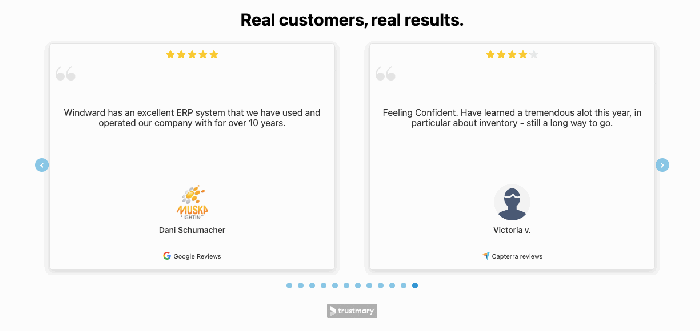With Using Testimonials in Marketing at the forefront, this paragraph opens a window to an amazing start and intrigue, inviting readers to embark on a storytelling american high school hip style filled with unexpected twists and insights.
Testimonials play a crucial role in marketing strategies, showcasing the positive experiences of customers and building credibility for brands. In a world where trust is key, leveraging testimonials can be a game-changer for businesses looking to connect with their audience on a more personal level.
Importance of Testimonials in Marketing: Using Testimonials In Marketing

Testimonials play a crucial role in marketing strategies by providing social proof and building trust with potential customers. When people see positive feedback from others who have used a product or service, they are more likely to feel confident in making a purchase decision.
Examples of Successful Companies Using Testimonials
- Apple – Apple’s “Shot on iPhone” campaign features user-generated testimonials showcasing the quality of photos taken with their iPhones, which has been highly effective in marketing their products.
- Peloton – Peloton often shares customer success stories and testimonials on social media and in their advertising, highlighting the transformative impact of their fitness equipment on people’s lives.
- Amazon – Amazon includes customer reviews and ratings on product pages, giving shoppers valuable insights from real users to help them make informed buying choices.
How Testimonials Build Trust and Credibility
Testimonials create credibility for a brand by showing that real people have had positive experiences with their products or services. This builds trust with potential customers who are more likely to believe the word of other consumers over traditional advertising. By showcasing testimonials, companies can establish a sense of authenticity and reliability, ultimately leading to increased sales and brand loyalty.
Types of Testimonials
When it comes to testimonials in marketing, there are various types that businesses can utilize to showcase the positive experiences of their customers. Each type of testimonial has its own unique way of reaching the target audience and influencing their purchasing decisions.
Written Testimonials
Written testimonials are one of the most common types, where customers provide feedback in written form. These testimonials are often displayed on a company’s website, social media pages, or marketing materials. They are effective in building credibility and trust among potential customers who can read about the positive experiences of others.
Video Testimonials
Video testimonials take written testimonials to the next level by providing a visual representation of a customer’s experience. Seeing and hearing a satisfied customer talk about a product or service can have a powerful impact on viewers. Video testimonials are often shared on social media platforms and websites, making them highly engaging and shareable.
Social Media Endorsements
Social media endorsements involve customers sharing their positive experiences with a product or service on platforms like Instagram, Facebook, or Twitter. These testimonials can reach a wide audience and are considered authentic as they come directly from customers. Businesses can repost or share these endorsements to increase brand credibility and reach new customers.
Examples of Businesses Utilizing Testimonials
– Amazon: Amazon displays written testimonials on product pages to help customers make informed purchasing decisions.
– Apple: Apple uses video testimonials featuring satisfied customers using their products to showcase the user experience.
– Nike: Nike leverages social media endorsements from athletes and influencers to promote their products to a wider audience.
By utilizing a mix of written testimonials, video testimonials, and social media endorsements, businesses can effectively showcase the positive feedback from customers and build trust with their target audience.
Collecting Testimonials
When it comes to collecting testimonials, it’s crucial to ensure that they are authentic and compelling. Here are some strategies to help you gather testimonials from your customers:
Asking for Testimonials
- Reach out to satisfied customers directly and ask them to share their feedback.
- Provide a simple and user-friendly platform for customers to submit their testimonials easily.
- Incentivize customers by offering discounts, freebies, or other rewards in exchange for their testimonials.
Permission and Approval
Before using any testimonials in your marketing materials, always seek permission from the customers who provided them. This not only builds trust but also ensures that you are using testimonials legally and ethically.
Incentivizing Customers
- Offer exclusive deals or discounts to customers who leave testimonials on your website or social media pages.
- Run a contest where customers can win prizes for sharing their experiences with your products or services.
- Send personalized thank you notes or tokens of appreciation to customers who take the time to write testimonials for your business.
Implementing Testimonials in Marketing

Implementing testimonials strategically in marketing can significantly enhance brand reputation and increase conversions. Testimonials serve as social proof, reassuring potential customers about the quality of products or services offered. Here are some best practices for incorporating testimonials into various marketing channels:
Placing Testimonials on Websites and Social Media, Using Testimonials in Marketing
- Display testimonials prominently on the homepage of the website to build trust with visitors right away.
- Create a dedicated “Testimonials” page where customers can read and share their experiences with your brand.
- Utilize social proof by showcasing testimonials on social media platforms to reach a wider audience and engage with followers.
Enhancing Brand Reputation and Conversions
- Testimonials help establish credibility and trust, which are crucial for building a strong brand reputation.
- Positive testimonials can influence purchasing decisions and lead to higher conversion rates.
- Encourage satisfied customers to leave reviews and testimonials to continuously improve brand perception.
Incorporating Testimonials into Email Marketing and Advertising
- Include customer testimonials in email campaigns to provide social proof and encourage subscribers to take action.
- Use testimonials in advertising materials such as banners, flyers, and print ads to reinforce brand messaging and attract new customers.
- Personalize testimonials based on target audience demographics and preferences for maximum impact.





